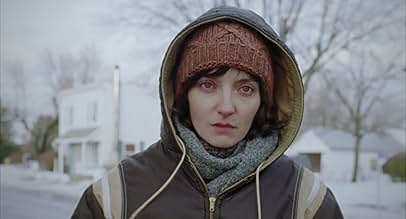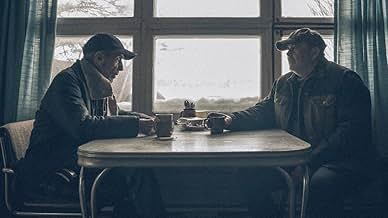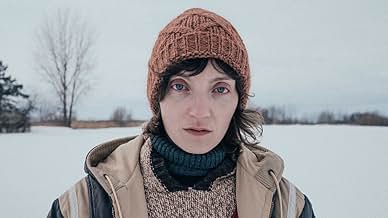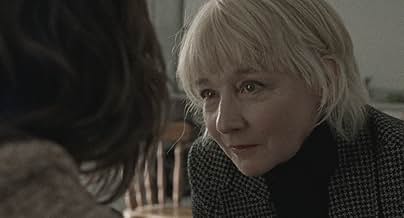NOTE IMDb
6,3/10
1,5 k
MA NOTE
Ajouter une intrigue dans votre langueIn a small and isolated town, Simon Dubé dies in a car accident. The stunned townspeople are reluctant to discuss the circumstances of the tragedy. From that point on time seems to lose all ... Tout lireIn a small and isolated town, Simon Dubé dies in a car accident. The stunned townspeople are reluctant to discuss the circumstances of the tragedy. From that point on time seems to lose all meaning, and the days stretch on without end.In a small and isolated town, Simon Dubé dies in a car accident. The stunned townspeople are reluctant to discuss the circumstances of the tragedy. From that point on time seems to lose all meaning, and the days stretch on without end.
- Réalisation
- Scénario
- Casting principal
- Récompenses
- 3 victoires et 21 nominations au total
Avis à la une
10EdgarST
The more advanced horror film of these times often moves away from archaic and explicit images, such as goat heads, anthropomorphic beings, murky ectoplasms, or satanic sacrifices. In general, every horror movie thrives on something basic like fear, which, in turn, arises from a lack of knowledge of something that is threatening someone's integrity. But in a contemporary and intelligent horror film like the excellent Canadian drama «Répertoire des villes disparues», although apparitions are not lacking, its plot deals with the social collapse of human communities, when they have reached the threshold of extinction.
The film begins with the death of Simon Dubé, a 21-year-old boy, whom the community mourns and whose parting words are delivered by the mayor, giving Simon's passing a relevance that is never explained, but which in the end will be consistent with the whole story. His brother Jimmy, his mother Gisele and his father Romuald are devastated. The three begin to see Simon, who appears to them without saying a word, but those who believe them think the apparitions are a manifestation of their grief. However, when Adele, the terrified village psychic, certifies the presence of strangers in the village; and when Pierre, the local café owner, sees --inside the abandoned house that he wants to buy-- four murdered children and his father, who committed suicide after doing so, there is no doubt that the town is "at risk." The Québec authorities gather most of the 215 residents of Irénée-les-Neiges to announce that these sightings have been reported in various rural areas.
The film is somehow a magnificent metaphor for the extinction of human communities, and hence the title of the film and the novel by Québec author Laurence Olivier that inspires it. The town mine has been closed, the young people are gone, the mayor tries to cheer up the residents, but the desolation increases. And the number of entities that have been seen around increases in the almost colorless, cold town, covered in snow, where snowfalls often hit the population. Like the character of the maid Emilia in Pasolini's «Teorema», Adele is the only person who is safe, seeking refuge in her own psyche and in her own holiness.
I had never seen a film from director Denis Coté, who signs here his eighth feature film, but with this work he has gained my admiration with his unhurried and elegant style to impress the public with a ghostly and overwhelming story, well-rooted in the social realities of our times.
The film begins with the death of Simon Dubé, a 21-year-old boy, whom the community mourns and whose parting words are delivered by the mayor, giving Simon's passing a relevance that is never explained, but which in the end will be consistent with the whole story. His brother Jimmy, his mother Gisele and his father Romuald are devastated. The three begin to see Simon, who appears to them without saying a word, but those who believe them think the apparitions are a manifestation of their grief. However, when Adele, the terrified village psychic, certifies the presence of strangers in the village; and when Pierre, the local café owner, sees --inside the abandoned house that he wants to buy-- four murdered children and his father, who committed suicide after doing so, there is no doubt that the town is "at risk." The Québec authorities gather most of the 215 residents of Irénée-les-Neiges to announce that these sightings have been reported in various rural areas.
The film is somehow a magnificent metaphor for the extinction of human communities, and hence the title of the film and the novel by Québec author Laurence Olivier that inspires it. The town mine has been closed, the young people are gone, the mayor tries to cheer up the residents, but the desolation increases. And the number of entities that have been seen around increases in the almost colorless, cold town, covered in snow, where snowfalls often hit the population. Like the character of the maid Emilia in Pasolini's «Teorema», Adele is the only person who is safe, seeking refuge in her own psyche and in her own holiness.
I had never seen a film from director Denis Coté, who signs here his eighth feature film, but with this work he has gained my admiration with his unhurried and elegant style to impress the public with a ghostly and overwhelming story, well-rooted in the social realities of our times.
Saw this at the Berlinale 2019, where it was part of the official Competition (but got no prize). Peculiarly, the venue was only half full, contrary to all other screenings in foregoing days in the Berlinale Competition with usually 1,750 viewers present in the same venue. I assume that many people thought this movie had all appearances of a downtrodder path Horror movie with zombies. That genre left traces by everyone, caused by bad B-movies we all sat through in the past but avoid them nowadays. However, this movie does not have any of the negative characteristics of said genre with a bad reputation. It is true that strange figures appear when the story progresses, but they stand still, make no sound and do not attack. They just stare from a safe distance.
The fatal car accident in the opening scene could have been a suicide or a real accident. We saw it happen and we can't tell either way, and neither has the police any idea. The dilemma casts a shadow over all daily tasks within the village. The uncertainty eats the villagers, and the topic returns several times in conversations. It is a closed community of 200 to 300 people, committed to support each other, to the extent that outside help is flatly refused by the mayor.
At first, we see nothing out of the ordinary. But strange things start happening, albeit innocent and harmless. Gradually, it gets stranger and stranger. The first time that we come to think there is more to it than just strangers wandering around, is when a "social worker lady" is locked up after one of the unknown figures outside a derilicted building slams the door while she is inside. No harm gets to her, she easily escapes and reports the incident. Without any witnesses she meets nothing but disbelief. Probably a "weak nerves" case is a common conclusion.
When more and more strange figures appear, we become gradually aware that something is really going on. The figures do not harm anyone. They maintain a safe distance from the villagers, they just stand there and make no sound. Nevertheless, their mere presence feels threatening. It is no use to describe what happens next. Suffice to say that situation and atmosphere "got" me. It became more intense by the minute. I have no explanation why, and also no idea how the film makers achieved the effect it had. For me a unique experience, as most "horror" movies have no effect on me at all.
I must confess to be slightly put off at first, due to the festival announcement talking about the 16 mm format intended to strengthen the admosphere, and that traditional celluloid was used for similar reasons. This sounded like a typical case of format-over-substance. In other words, conversation pieces for professional critics and film makers, but shooting over the heads of layman viewers like myself. But I stand corrected and my prejudice proved false. Despite the format and the cellulloid, or maybe even thanks to this, the atmosphere took me in and kept me interested all the time.
All in all, an intriguing movie by effectively letting a tense atmosphere grow on me, something I felt deep inside. I wonder how the film makers did it.
The fatal car accident in the opening scene could have been a suicide or a real accident. We saw it happen and we can't tell either way, and neither has the police any idea. The dilemma casts a shadow over all daily tasks within the village. The uncertainty eats the villagers, and the topic returns several times in conversations. It is a closed community of 200 to 300 people, committed to support each other, to the extent that outside help is flatly refused by the mayor.
At first, we see nothing out of the ordinary. But strange things start happening, albeit innocent and harmless. Gradually, it gets stranger and stranger. The first time that we come to think there is more to it than just strangers wandering around, is when a "social worker lady" is locked up after one of the unknown figures outside a derilicted building slams the door while she is inside. No harm gets to her, she easily escapes and reports the incident. Without any witnesses she meets nothing but disbelief. Probably a "weak nerves" case is a common conclusion.
When more and more strange figures appear, we become gradually aware that something is really going on. The figures do not harm anyone. They maintain a safe distance from the villagers, they just stand there and make no sound. Nevertheless, their mere presence feels threatening. It is no use to describe what happens next. Suffice to say that situation and atmosphere "got" me. It became more intense by the minute. I have no explanation why, and also no idea how the film makers achieved the effect it had. For me a unique experience, as most "horror" movies have no effect on me at all.
I must confess to be slightly put off at first, due to the festival announcement talking about the 16 mm format intended to strengthen the admosphere, and that traditional celluloid was used for similar reasons. This sounded like a typical case of format-over-substance. In other words, conversation pieces for professional critics and film makers, but shooting over the heads of layman viewers like myself. But I stand corrected and my prejudice proved false. Despite the format and the cellulloid, or maybe even thanks to this, the atmosphere took me in and kept me interested all the time.
All in all, an intriguing movie by effectively letting a tense atmosphere grow on me, something I felt deep inside. I wonder how the film makers did it.
Do you believe in ghosts? Do you believe in other dimensions? Do you believe in reincarnation? Ghost Town Anthology is a film that brings questions like this to the forefront of your consciousness. The film opens with a frigidly framed car crash, that appears to happen out of nowhere, finding a way to sneak between sounds of the wind blowing and the trees creaking. The driver of the car was Simon Dube played by Phillipe Charette, leaving behind his distraught parents Romuald played endearingly by Jean-Michel Anctil and Gisele played by Josée Deschênes. His older brother Jimmy played with skill by Robert Naylor picks the film up from his brother's death, beginning a search for his brother because in his mind he could not have just left him like that even though the audience can see that Jimmy knows the true cause of his brother's death and it was not accidental, making Jimmy's search for signs of his brother all the more heart wrenching. The father, Romuald, tells his wife Giselle he is going to buy cigarettes, ultimately leaving a note explaining that he needs time and space to mourn the death of his son. Personally the scenes that followed of the father Romuald and his grieving process were some of my favorite moments of the film and the director makes no attempt at making it clear if the father is ever going to actually return.
The director of Ghost Town Anthology, Dennis Cote has quite a vision and understanding of spiritual imagery and feeling, the sound design is something that is so unique and unnervingly special. The brilliance of it is chiefly noticeable in the fathers grieving scenes. Cote masks bleak desolate moving landscapes shot as if the camera has been mounted in a 1987 pickup truck, with sounds of wind, static, and crackling; the only difference being in the patterns the sounds play in is completely different from anything I have heard before. The film was shot in 16mm and in these brief moments the 16mm film looks much closer to 8mm film, clearly having been scratched and tampered with by the creators of the film and then developed in black and white to add to the lo-fi feelings being heavily transmitted through the film. The camera movements in these very vague almost elusive scenes is all the more interesting, if it doesn't feel like it's been mounted to a pickup truck, it feels as if it's been mounted to a wounded animal walking its way to its demise, trudging along the bare landscape.
The death of the boy sends shockwaves through the small town, ultimately becoming the sole focus of the town's mayor Simone Smallwood, played by Diane Lavallée, who appears to have one sole mission in life and that is to ensure that her town carries on its daily life, every day, with no change or help from outsiders. As a reaction to the boy's death, a political official known to Smallwood sends a psychiatrist from the "big city" to assist with the psychological effects of the boy's death in the town. The new face is quickly dismissed by the mayor who claims that the towns people is made up of "grown ups" and they can "handle themselves", leaving the story to the isolation of the few faces the audience has seen. One of the faces that is most intriguing is a woman named Adele, played by Larissa Corriveau. Adele is the type of character whom simply steals the camera because she has a look that is so unusual and uncanny. Her character is a supposed newcomer to the town, making it all the more interesting due to her severe social anxiety. Dennis Cote captures how one feels when they have social anxiety with swift minimalism, particularly in a scene early on in the film where he utilizes a tracking shot. The camera tracks Adele from the washroom of a New Year's Eve party, in the middle of a pep talk nonetheless, all the way through the party until she encounters Jimmy and his best friend Andre. The way Larissa Corriveau walks through the party, making sure to never once look in place, avoiding physical contact and eye contact is beyond an accurate depiction of social anxiety and she hits her marks perfectly. The dialogue between Adele, Jimmy and Andre is innocent and naturally dry, a true contender for the most cringe worthy moment in cinema this year.
As strange people begin to arrive in the town including Jimmy having an encounter with his recently deceased brother with no explanation and more and more of the townspeople beginning to see the people themselves the film shifts its gears to more serious questions. There are multiple scenes with supremely high tension in the gradual revealing of these strange arrivals to the town. The town's people begin to almost show frustration to their attendance, not because they are ghosts but because it further punctuates their isolation by having these people show up. What more of a reason to move to the big city than having the dead walk your neighbourhood, right? This commentary of life and death, and exposure versus isolation become very focal themes in the film and it makes for truly different cinema.
Overall the film is quite good, although at times disorganized and scattered with the plot and character development. Dennis Cote has made primarily documentaries and experimental films, having Ghost Town Anthology be considered as his first official feature film. The application of 16mm film and shaky cam prove effective in not only the setting and story but mesh perfectly with Cote's eye and style. The film feels as if it is a short film that has been extended and obviously this can be attributed to Cote's former projects. It would be interesting to see him apply his eye for human nature and psychology to something slightly less experimental. In the end Ghost Town Anthology raises lots of questions about life, death, reincarnation and having enough time, and it is a quality contribution to the supernatural genre.
The director of Ghost Town Anthology, Dennis Cote has quite a vision and understanding of spiritual imagery and feeling, the sound design is something that is so unique and unnervingly special. The brilliance of it is chiefly noticeable in the fathers grieving scenes. Cote masks bleak desolate moving landscapes shot as if the camera has been mounted in a 1987 pickup truck, with sounds of wind, static, and crackling; the only difference being in the patterns the sounds play in is completely different from anything I have heard before. The film was shot in 16mm and in these brief moments the 16mm film looks much closer to 8mm film, clearly having been scratched and tampered with by the creators of the film and then developed in black and white to add to the lo-fi feelings being heavily transmitted through the film. The camera movements in these very vague almost elusive scenes is all the more interesting, if it doesn't feel like it's been mounted to a pickup truck, it feels as if it's been mounted to a wounded animal walking its way to its demise, trudging along the bare landscape.
The death of the boy sends shockwaves through the small town, ultimately becoming the sole focus of the town's mayor Simone Smallwood, played by Diane Lavallée, who appears to have one sole mission in life and that is to ensure that her town carries on its daily life, every day, with no change or help from outsiders. As a reaction to the boy's death, a political official known to Smallwood sends a psychiatrist from the "big city" to assist with the psychological effects of the boy's death in the town. The new face is quickly dismissed by the mayor who claims that the towns people is made up of "grown ups" and they can "handle themselves", leaving the story to the isolation of the few faces the audience has seen. One of the faces that is most intriguing is a woman named Adele, played by Larissa Corriveau. Adele is the type of character whom simply steals the camera because she has a look that is so unusual and uncanny. Her character is a supposed newcomer to the town, making it all the more interesting due to her severe social anxiety. Dennis Cote captures how one feels when they have social anxiety with swift minimalism, particularly in a scene early on in the film where he utilizes a tracking shot. The camera tracks Adele from the washroom of a New Year's Eve party, in the middle of a pep talk nonetheless, all the way through the party until she encounters Jimmy and his best friend Andre. The way Larissa Corriveau walks through the party, making sure to never once look in place, avoiding physical contact and eye contact is beyond an accurate depiction of social anxiety and she hits her marks perfectly. The dialogue between Adele, Jimmy and Andre is innocent and naturally dry, a true contender for the most cringe worthy moment in cinema this year.
As strange people begin to arrive in the town including Jimmy having an encounter with his recently deceased brother with no explanation and more and more of the townspeople beginning to see the people themselves the film shifts its gears to more serious questions. There are multiple scenes with supremely high tension in the gradual revealing of these strange arrivals to the town. The town's people begin to almost show frustration to their attendance, not because they are ghosts but because it further punctuates their isolation by having these people show up. What more of a reason to move to the big city than having the dead walk your neighbourhood, right? This commentary of life and death, and exposure versus isolation become very focal themes in the film and it makes for truly different cinema.
Overall the film is quite good, although at times disorganized and scattered with the plot and character development. Dennis Cote has made primarily documentaries and experimental films, having Ghost Town Anthology be considered as his first official feature film. The application of 16mm film and shaky cam prove effective in not only the setting and story but mesh perfectly with Cote's eye and style. The film feels as if it is a short film that has been extended and obviously this can be attributed to Cote's former projects. It would be interesting to see him apply his eye for human nature and psychology to something slightly less experimental. In the end Ghost Town Anthology raises lots of questions about life, death, reincarnation and having enough time, and it is a quality contribution to the supernatural genre.
I think somebody forgot to create a conflict or subject in the plot.. i didnt enjoy except baloon girl... MUBI keep the money but give my precious time back that i lost for this movie at least 40 percent of it
Amazing film that deserves all the attention in the world. The cast selection is perfect (and i wish them all the utmost success) but Robert Naylor's performance stole the show for me. Seen him in some other stuff and always look forward to his next character.
Le saviez-vous
- AnecdotesAdèle is the only character to wear colorful clothing.
- GaffesDuring the levitation scenes, the 'altitude' of Adèle in the sky changes from scene to scene.
- ConnexionsFeatured in 2020 Canadian Screen Awards for Cinematic Arts (2020)
Meilleurs choix
Connectez-vous pour évaluer et suivre la liste de favoris afin de recevoir des recommandations personnalisées
Détails
- Date de sortie
- Pays d’origine
- Langue
- Aussi connu sous le nom de
- Ghost Town Anthology
- Lieux de tournage
- Saint-Michel, Québec, Canada(interior and exterior locations)
- Société de production
- Voir plus de crédits d'entreprise sur IMDbPro
- Durée1 heure 37 minutes
- Couleur
- Rapport de forme
- 1.85 : 1
Contribuer à cette page
Suggérer une modification ou ajouter du contenu manquant

Lacune principale
By what name was Répertoire des villes disparues (2019) officially released in India in English?
Répondre

































